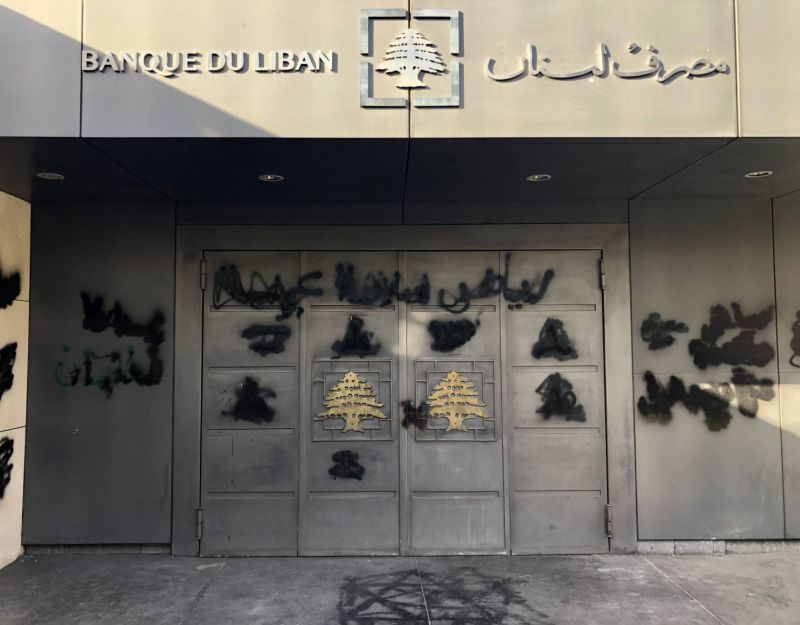
BDL has said it will intervene in the market to absorb liquidity to support the market value of the lira “if it deems [this] appropriate and within its capabilities.” (Credit: Philippe Hage Boutros/L'Orient-Le Jour)
BEIRUT — After a weekslong delay, Banque du Liban has launched Sayrafa, a currency exchange platform that aims to begin the process of eliminating black market currency exchange businesses by becoming the official reference point for the Lebanese lira’s market value.
Although the central bank’s new platform was expected to specify the rate at which money changers should buy and sell foreign currencies, it has not yet done so. Instead, licensed exchangers are “temporarily” allowed to trade dollars at a market rate of their choosing, a major money exchanger told L’Orient Today on condition of anonymity, citing business concerns.
“The central bank is currently gathering data to measure the market size and the volume of currency exchange operations,” the source said, adding that when it has this information it is likely to set an exchange rate.
The lira has lost about 88 percent of its value since it began to deviate from the official peg of LL1,507.5 to the dollar during the second half of 2019.
As licensed exchangers wait for BDL to set the lira market price, they have opted to price the national currency according to the rate available on mobile exchange rate applications, Mahmoud Mourad, the head of the Syndicate of Money Changers, told L’Orient Today. On Monday, that rate was around LL12,600 to the dollar.
The rate set by these applications has previously been described by top officials as “illegal,” as despite the lira’s collapse the currency technically remains pegged to the dollar.
Under the terms of the new platform, each morning, licensed money changers are required to report their transactions and cash holdings, in lira and foreign currencies, to the central bank via Sayrafa.
To exchange dollars for lira, individuals must provide their personal information, including their telephone number and a copy of their ID.
Previously, such information was only necessary if the amount to be exchanged exceeded $10,000.
“Several customers refused today to provide us with their IDs before selling us their dollars,” Morad said, adding that clients should get used to this system in order for Sayrafa to succeed.
Under Sayrafa, not everyone can buy dollars from licensed exchange shops. Only employers of foreign domestic workers, families of Lebanese students at foreign universities who need to pay their tuition and rent abroad, and foodstuff importers will be able to purchase hard currencies.
Employers of foreign domestic workers are required to provide the worker’s passport and residency permit, as well as their own ID, while families of students studying abroad must present the student’s university card, a previously paid invoice and the student’s rental contract.
Food importers will be required to provide their corporate documents, including a commercial record, Finance Ministry registration, the company owner’s ID and invoices for the requested dollars.
Other customers who need to buy dollars are required to provide a legitimate “purpose of transaction,” the details of which remain unclear, the source said. “The section on Sayrafa to register these operations isn’t functioning for the time being,” the source added.
The Syndicate of Money Changers was unable to reach the central bank on Monday to raise questions about some aspects of the platform, Morad said.
President Michel Aoun’s office, when announcing the platform nearly two months ago, said Sayrafa would also allow commercial banks to buy and sell currencies at the market rate, just like money changers. However, the platform is still not operating for commercial banks, a senior banking source told L’Orient Today on condition of anonymity.
The central bank will intervene in the market to absorb liquidity to support the market value of the lira “if it deems [this] appropriate and within its capabilities,” the central bank said in a circular addressing commercial banks last Monday.
However, BDL’s ability to inject hard currencies into the market is questionable given its dwindling hard currency reserves. The finance minister has previously warned that the country may run out of money to cover imports of basic necessities by the end of this month.
Neither Banque du Liban nor the Association of Banks’ spokesperson could be reached for immediate comment.
The platform will not affect commercial banks’ deposits. Depositors will continue to be able to withdraw up to $5,000 of their dollar deposits at LL3,900 to the dollar and at the official peg of LL1,500 to the dollar thereafter. Therefore, depositors will keep on receiving haircuts on their deposits while withdrawing a depreciating currency.
The treatment of “fresh dollar” accounts — hard currency deposits placed at commercial banks after April 9, 2020 — will remain unchanged.